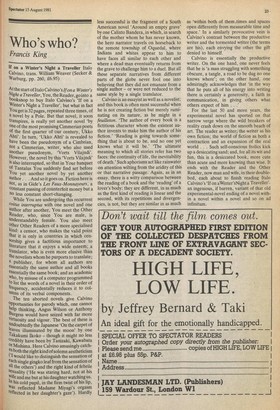Who's who?
Francis King
If on a Winter's Night a Traveller Italo Calvino, trans. William Weaver (Secker & Warburg, pp. 260, £6.95) At the start of Italo Calvino's Ifon a Winter's Night a Traveller, You, the Reader, go into a booksnop to buy Italo Calvino's 'If on a Winter's Night a Traveller', but what in fact You get is 32 pages, repeated three times, of a novel by a Pole. But that novel, it soon transpires, is really yet another novel 'by. one of the most promising Cimmerian poets of the first quarter of our century, Ukko Ahti'. In turn, `Ukko Ahti' is revealed to have been the pseudonym of a Cimbiian, not a Cimmerian, writer, who also used another pseudonym, `Vorts Vilajndi'. However, the novel by this Worts Vilajndi' IS also interrupted, so that in Your banquet of Tantalus You suddenly find set before You yet another novel by yet another author. . . And so it goes on. Fiction here is not, as in Gide's Les Faux-Monnayeurs, a constant passing of counterfeit money but a no less constant short-changing. While You are undergoing this recurrent couus interruptus with one novel and one author after another, You meet the Other Reader, who, since You are male, is understandably female. You also meet Other Other Readers of a more specialised kind: a censor, who makes the valid point that it is only in countries in which censorship gives a factitious importance to literature that it enjoys a wide esteem; a translator, who is even more elusive than the novelists whom he purports to translate; a publisher, for whom all authors are essentially the same author and all books essentially the same book; and an academic who, by misuse of a computer programmed to list the words of a novel in their order of frequency, accidentally reduces it to columns of its verbal components.
The ten aborted novels give Calvino °, PPortunities for parody which, one cannot help thinking, Angus Wilson or Anthony Burgess would have seized with far more virtuosity and vigour. The best of these is undoubtedly the Japanese 'On the carpet of leaves illuminated by the moon' by one Takakumi Ikoko — though it might no less Credibly have been by Tanizaki, Kawabata or Mishima. Here Calvino amusingly catches both the right kind of solemn aestheticism ( I would like to distinguish the sensation of each single gingko leaf from the sensation of all the others') and the right kind of febrile sexuality ('He was staring hard, not at his Wife and me but at his daughter watching us. In his cold pupil, in the firm twist of his lip, Was reflected Madame Miyagi's orgasm reflected in her daughter's gaze). Hardly less successful is the fragment of a South American novel 'Around an empty grave' by one Calixto Bandera, in which, in search of the mother whom he has never known, the hero narrator travels on horseback to the remote township of Oquedal, where Indians and whites appear to him to have faces all similar to each other and where a dead man eventually returns from the grave to challenge him to a duel. But all these separate narratives from different parts of the globe never fool one into believing that they did not emanate from a single author — or were not reduced to the same style by a single translator.
Calvino is an essayist as well as a novelist; and this book is often most successful when he is not creating fiction but merely ruminating on its nature, as he might in a feuilleton. 'The author of every book is a fictitious character whom the existent author invents to make him the author of his fiction.' Reading is going towards something that is about to be, and no one yet knows what it will be.' The ultimate meaning to which all stories refer has two faces: the continuity of life, the inevitability of death.' Such aphorisms act like rainwater on attention wilting from the aridity of this or that narrative passage. Again, as in an essay, there is a witty comparison between the reading of a book and the 'reading' of a lover's body: they are different, in as much as the first kind of reading is linear and the second, with its repetitions and divergencies, is not, but they are similar in as much as 'within both of them ,times and spaces open differently from measurable time and space.' In a similarly provocative vein is Calvino's contrast between the productive writer and the tormented writer (the terms are his), each envying the other the gift denied to himself.
Calvino is essentially the productive writer. On the one hand, one never feels that he is 'a man struggling with something obscure, a tangle, a road to be dug no one knows where'; on the other hand, one admiringly acknowledges that 'in the way that he puts all of his energy into writing there is certainly a generosity, a faith in communication, in giving others what others expect of him . .
For the last 50 and more years, the experimental novel has sported on that narrow verge where the wild breakers of reality crash down on the smooth beach of art. The reader as writer; the writer as his own fiction; the world of fiction as both a contraction and an expansion of the real world . . . Such self-conscious frolics kick up a desiccating sand; and, for all its wit and fun, this is a desiccated book, more cute than acute and more knowing than wise. It ends with the Reader and the Other Reader, now man and wife, in their doublebed, each about to finish reading Italo Calvino's 'If on aWinter'sNight a Traveller'an ingenious, if barren, variant of that old experimental-novel ending of a novel within a novel within a novel and so on ad infinitum.


































 Previous page
Previous page